Table of Contents
The rise of online communities has transformed the way we connect, share, and engage with others. These virtual spaces transcend geographical boundaries, enabling individuals from all corners of the world to unite over shared interests, professions, or even causes.
Online communities have become pivotal in fostering social interaction, offering support, facilitating professional networking, and enhancing learning opportunities. They serve as a melting pot of diverse perspectives, experiences, and knowledge, enriching the lives of their members in countless ways.
In this article, we delve into the various types of online communities that have emerged, each serving a distinct purpose and catering to different needs and interests. We explore the characteristics of each through examples and offer practical tips on how to build and nurture these communities, ensuring they remain vibrant, engaging, and beneficial for their members.
If you are a creator looking to build your online community or simply want to understand the diverse landscape of these virtual environments, stay put; this article is for you.
First, let’s go over some key benefits and statistics of online communities to better understand their impact.
Key Benefits of Online Communities
The importance of online communities lies not only in their ability to connect people but also in the immense value they add to their daily lives.
Whether it’s through shared hobbies, professional interests, educational pursuits, or supporting each other through life’s challenges, these communities have become an integral part of the modern social fabric.
Online communities help community members in the following ways:
Online communities offer a unique and safe space for individuals to find support, explore different perspectives, engage in meaningful conversations, and build networks that can have a lasting impact on the community members’ personal and professional lives.
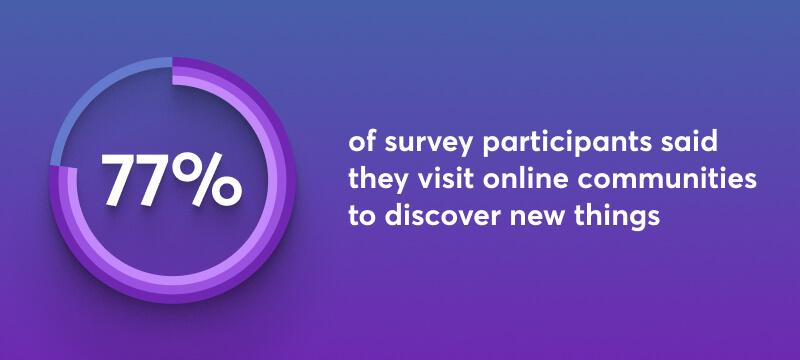
77% of survey participants said they visit online communities to discover new things
Did you know?
Apart from community members, though, online communities can help creators, businesses, and brands also in multiple ways:
For creators and entrepreneurs online communities carry immense value that can be found nowhere else, helping them grow and scale their business in multiple ways.
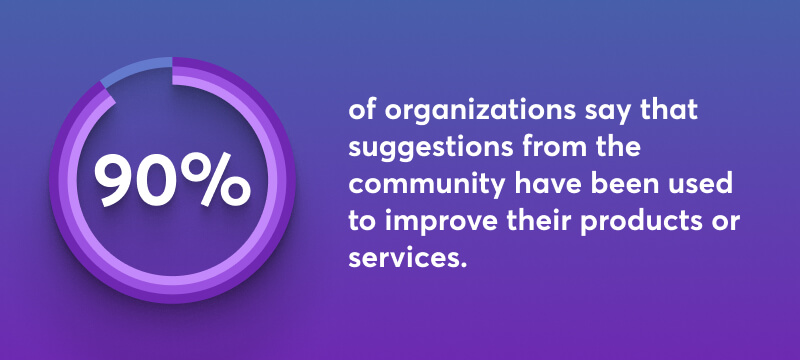
90% of organizations say that suggestions from the community have been used to improve their products or services.
Did you know?
Get Inspired: 21 Thriving Community Examples
Now, it’s time to explore the different types of online communities and identify the existing diverse use cases through real-life examples of successful online communities.
Type #1: Interest-Based Communities
These communities are a hub for individuals who share a common interest or hobby. They provide a platform where members can explore their passions, exchange knowledge, and connect with like-minded people.
For example, Reddit subreddits are dedicated to specific hobbies or Facebook groups centered around particular interests, such as music, gardening or photography. These spaces are often vibrant and highly engaged, with members actively participating in discussions, sharing tips, and even organizing in-person meet-ups.
Examples: Reddit subreddits, Pinterest, Facebook groups for specific hobbies or podcast communities.
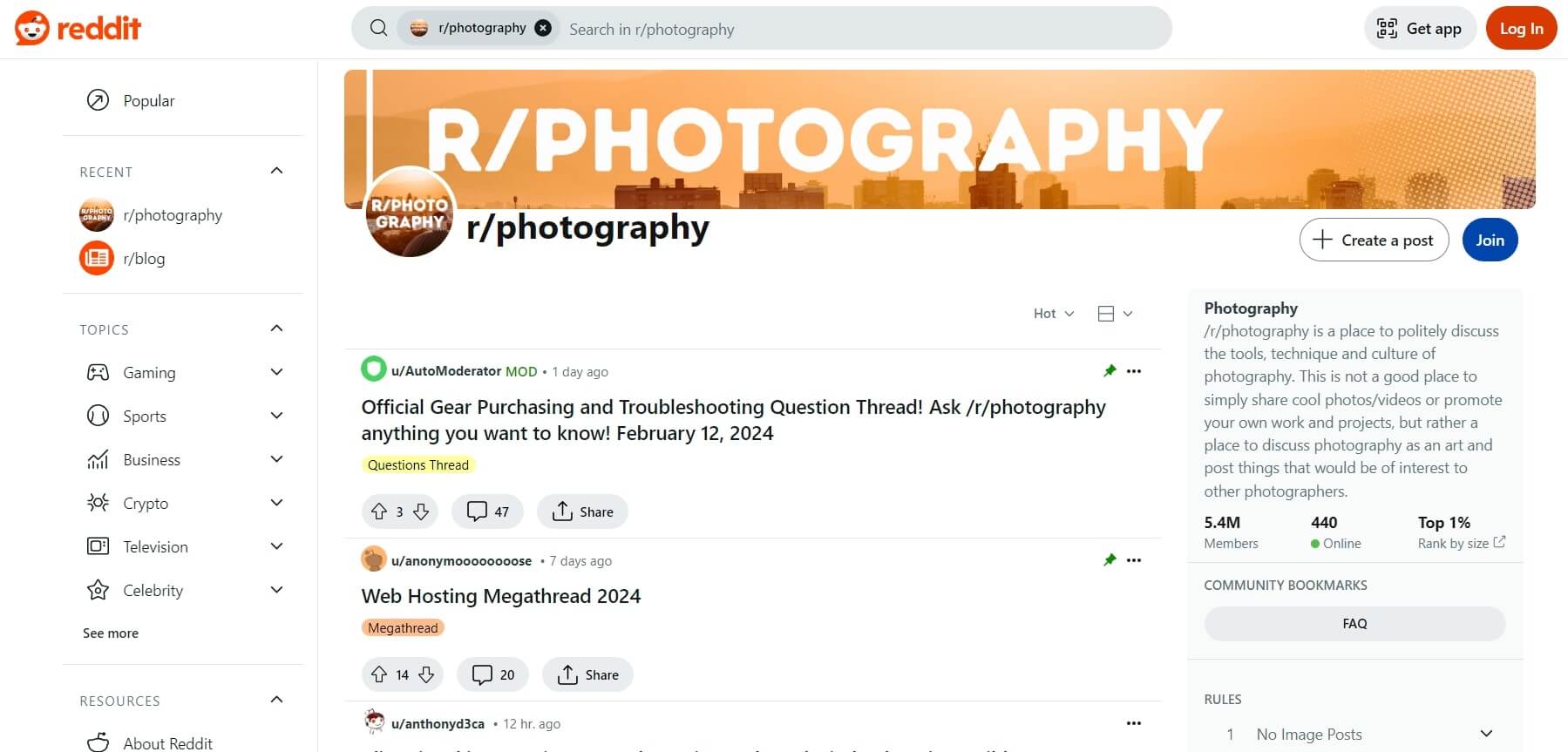
Reddit is a social media platform and online community where users can participate in discussions, share content, and engage with others on a wide range of topics. Reddit is organized into thousands of individual communities called “subreddits,” each dedicated to a specific interest, theme, or topic.
For example, there are subreddits dedicated to news, technology, gaming, sports, cooking, movies, music, and much more. Users can join subreddits relevant to their interests and participate in discussions with like-minded people.
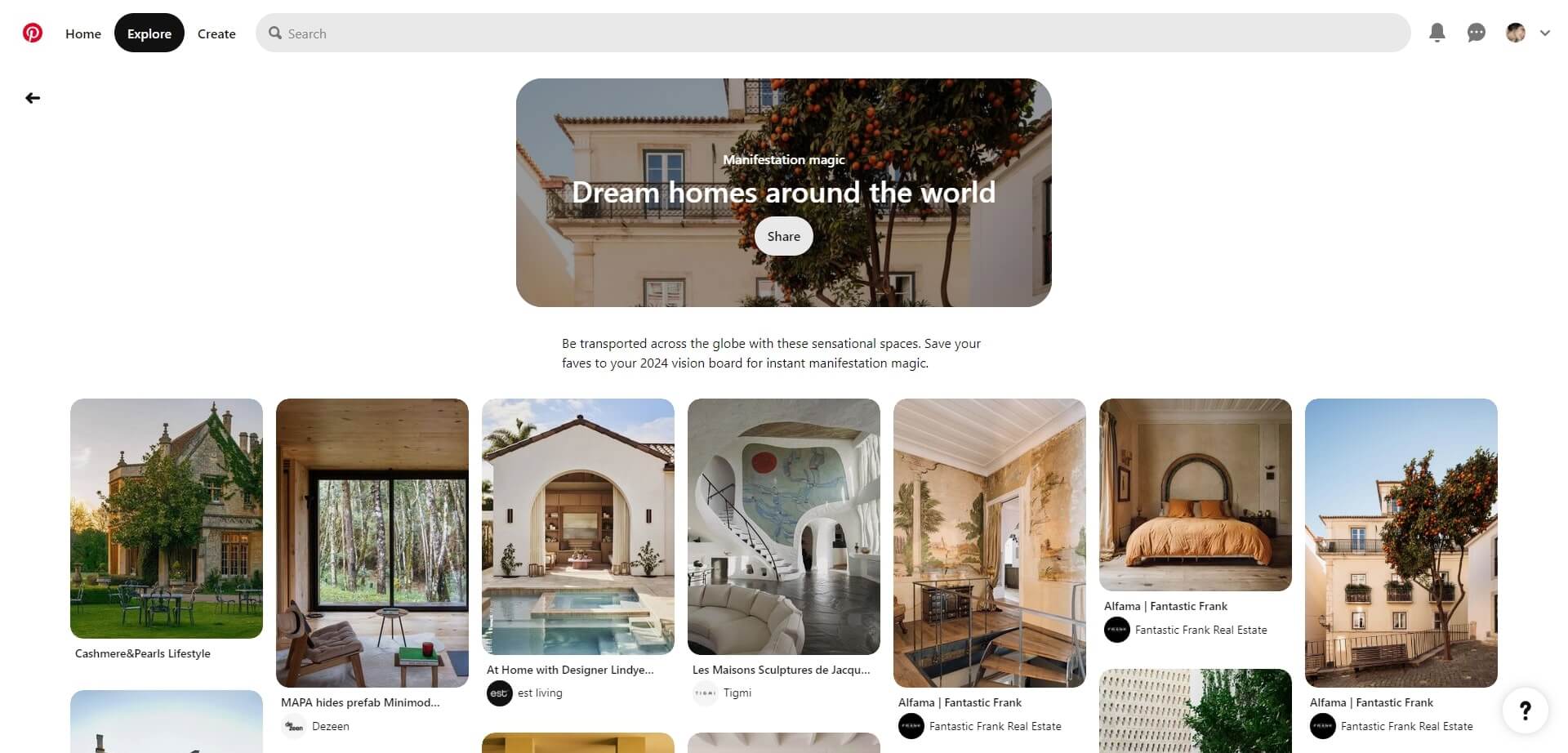
Social media platform and visual discovery tool – Pinterest, allows users to discover, save, and share images, videos, and articles on a wide range of topics. Pinterest is characterized by its use of “pins” – visual bookmarks – which users can collect and organize on personalized boards.
They can also share pins with others via a messaging app, email or social media. They can also collaborate on group boards where multiple users can contribute pins to a shared collection.
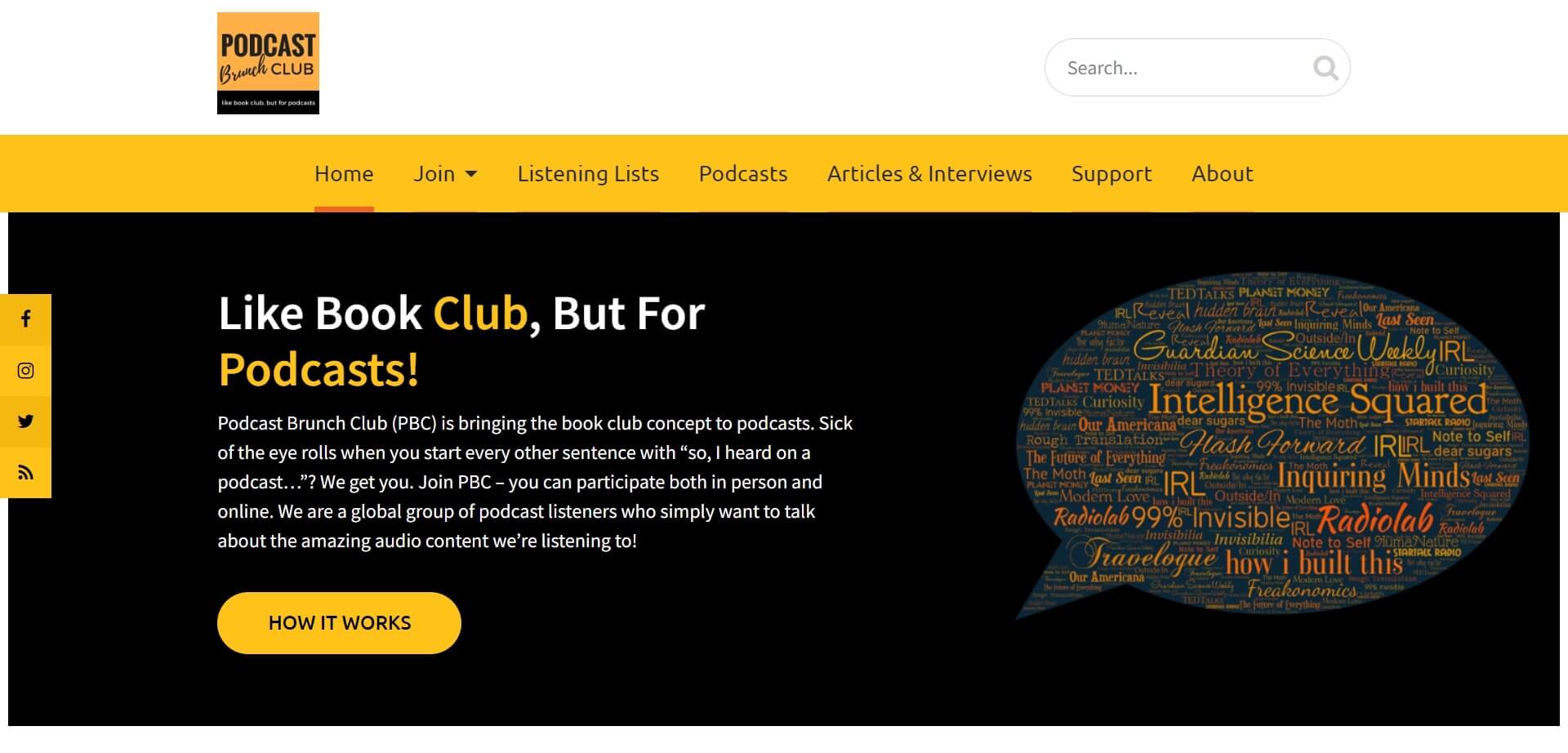
Podcast Brunch Club is a global community of podcast listeners who meet in person (or virtually) to discuss curated podcast playlists on various themes. Members listen to the selected podcasts independently and then come together to engage in thoughtful discussions about what they are currently listening to, and their new finds.
Tips for building: Identify and engage your niche, work on content creation, and fostering member discussions.
Type #2: Professional or Industry-Specific Communities
These networks cater to professionals within the same industry or field e.g. ed tech, facilitating a space for networking, career development, and industry-specific discussions.
LinkedIn groups or specialized forums are common examples, where members exchange insights, discuss industry trends, seek career advice, and share job opportunities. These communities are invaluable for professional growth, mentorship opportunities, and staying updated with industry advancements.
Examples: LinkedIn groups and industry-specific forums.
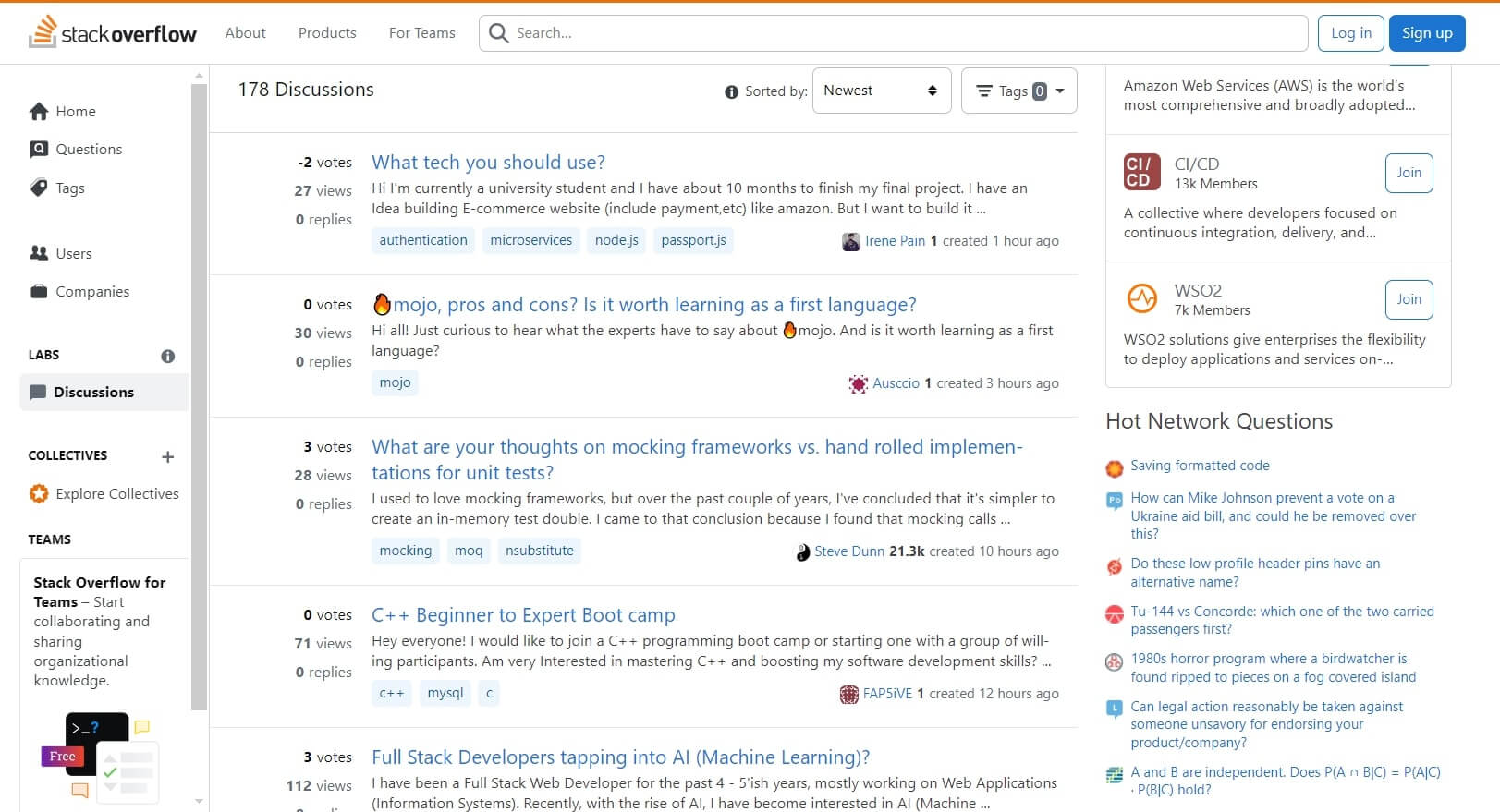
Stack Overflow is a popular online community and question-and-answer platform primarily focused on programming and software development. Currently it is one of the most widely-used resources for programmers and developers seeking assistance, guidance and knowledge-sharing within the software development community.
It has a large and active user base, making it a valuable resource for both beginners and experienced professionals. Users can post questions, upvode or downvote answers, follow topic tags, and earn reputation points for their contributions.
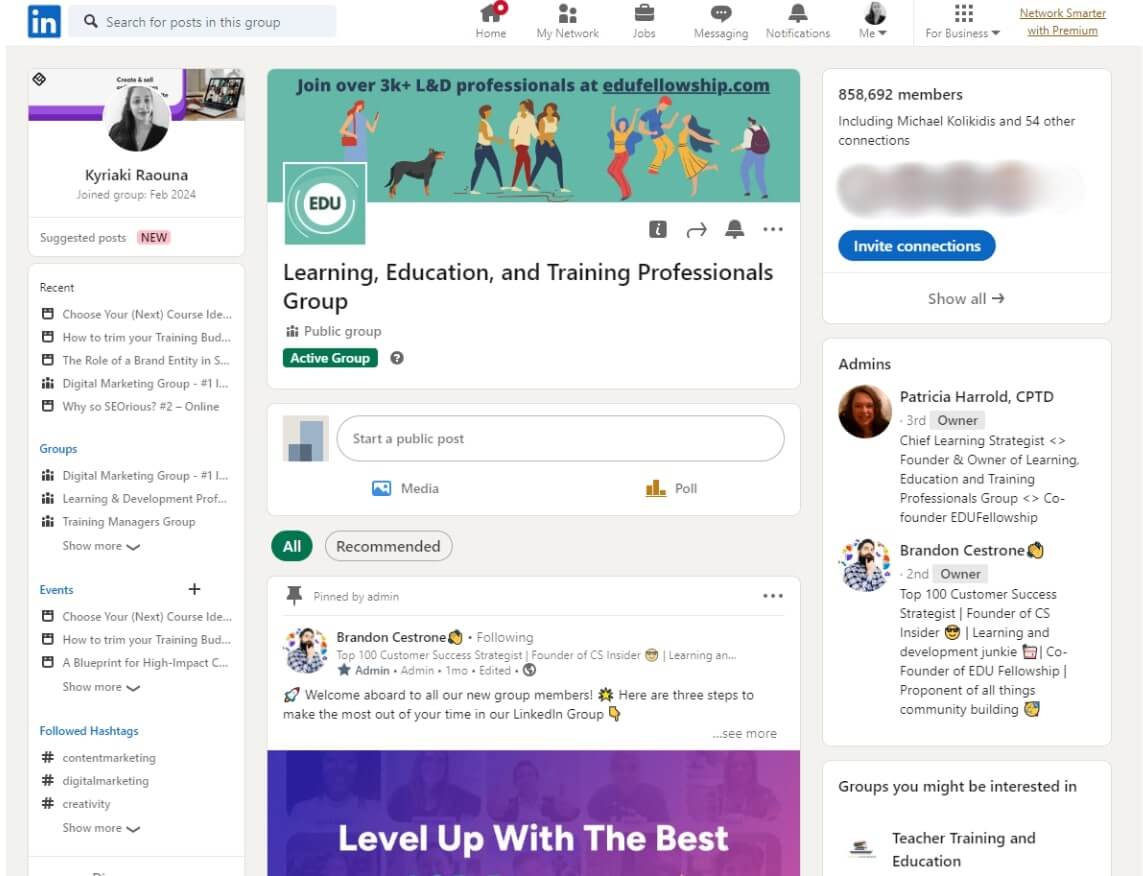
LinkedIn Groups are communities on the LinkedIn platform that focus on specific topics, industries, or interests. Members can join groups related to their profession, or career interests to connect with like-minded individuals, share knowledge, and participate in discussions.
The above example shows a public LinkedIn group created by EDU Fellowship for education and training professionals and individuals interested in learning and development.
Tips for building: Apply networking strategies, share industry news, host webinars or Q&A sessions.
Type #3: Learning Communities
Learning communities are dedicated to education and knowledge sharing. They span across various platforms, and can be found in online course platforms and learning management systems (LMS). They may refer to online study or discussion groups, forums, dedicated built-in learning communities or language exchange communities.
Members in learning communities engage in collaborative learning, share educational resources, and seek intellectual growth. These communities often feature real-time expert involvement, with educators, trainers, course creators, or seasoned professionals providing guidance to and facilitating discussions with students.
Examples: Online study groups, MOOC forums, and language exchange platforms.
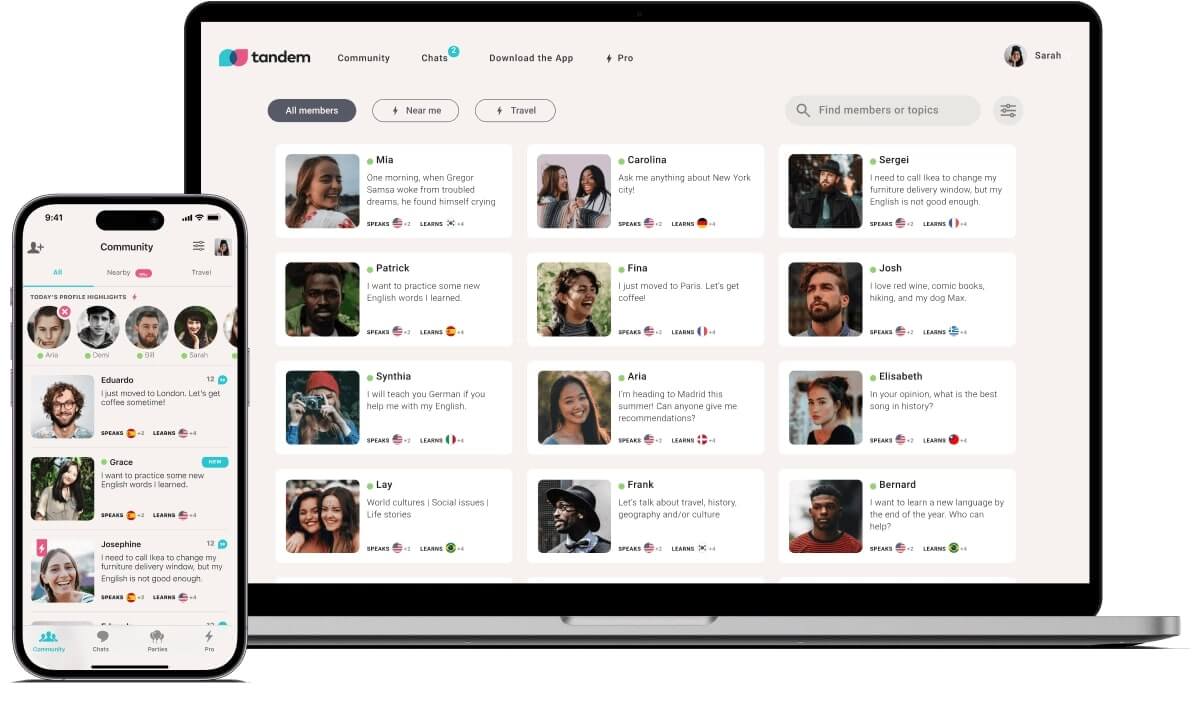
Tandem is a language exchange app and online platform that connects language learners with native speakers around the world. The app allows users to practice speaking, writing, and listening in their target language while helping others learn their native language.
On top of one-on-one language exchange partnerships, Tandem offers community features such as group chats, language learning challenges, and language exchange events. Users can join group chats based on language interests or participate in community activities to connect with other language learners and native speakers.
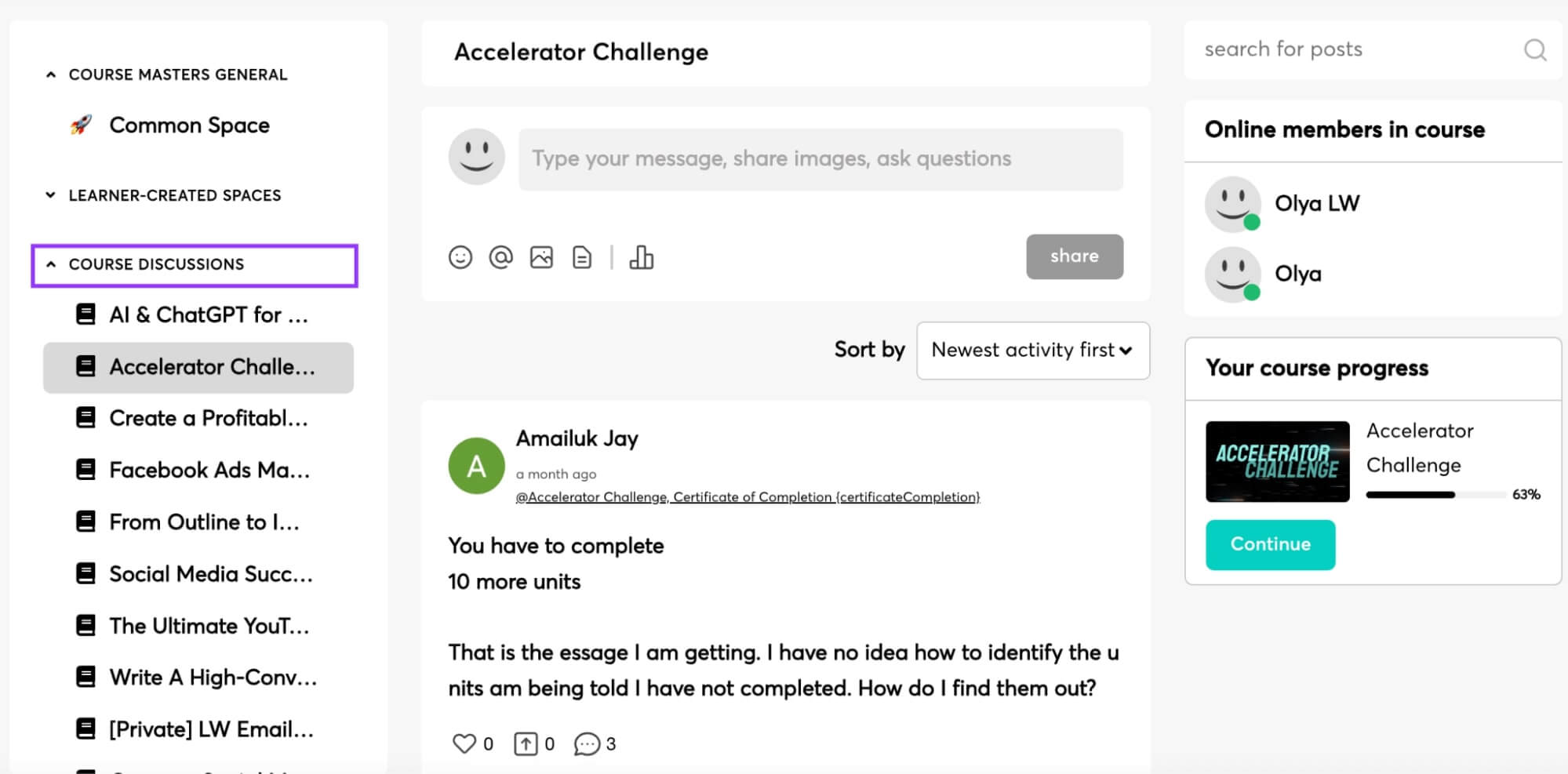
LearnWorlds built-in community offers discussion forums within its course interface where learners can interact with each other and with the course instructor. These forums allow learners to ask questions, share insights, and discuss course-related topics.
These are typically organized by course topic, with separate discussion threads for each course module or subject category. This organization helps learners find relevant discussions and engage with course-related content in a structured manner.
Tips for building: Make use of collaborative learning techniques, resource sharing, expert involvement, share bite-sized information, giving members the space to learn.
Looking for an online course platform or LMS with robust community-building features? Get your 30-day trial with LearnWorlds today and start building your own dedicated community of learners. No community integration needed!
Type #4: Support and Advocacy Communities
These communities are essential for individuals seeking advice, support, and a sense of belonging. They range from mental health forums to environmental advocacy groups run by non-profit organizations, offering a safe space for sharing personal experiences, seeking guidance, and rallying around common causes.
The strength of these communities lies in their ability to foster emotional connections, provide comfort, and empower members to support each other and advocate for important issues.
Examples: Mental health forums and environmental advocacy groups.
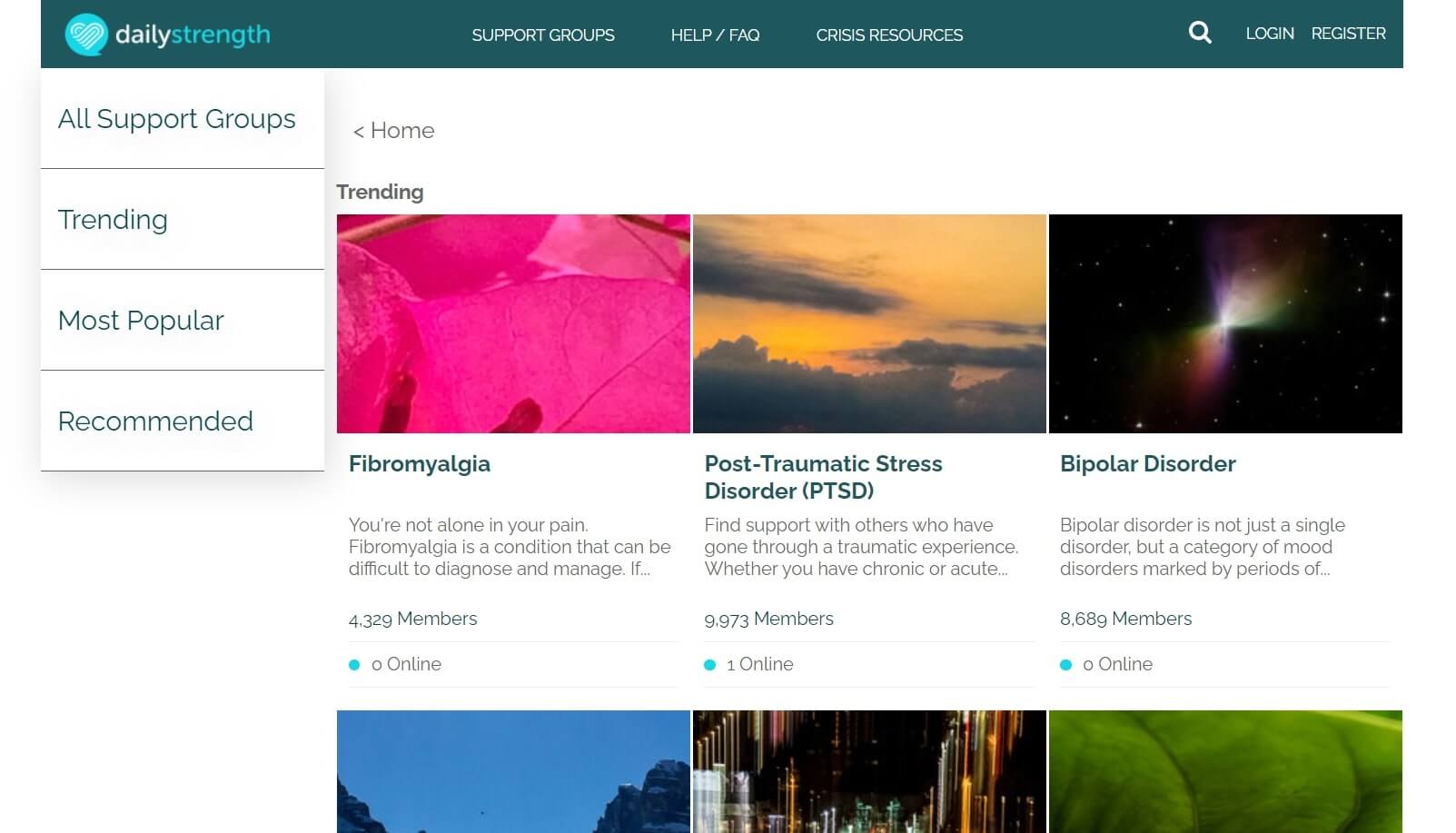
DailyStrength is an online support community and social network that provides a platform for individuals facing various health and wellness challenges to connect, share experiences, and seek support from others who understand their struggles.
It offers a wide range of support groups covering topics such as mental health, chronic illnesses, addiction recovery, relationship issues, and more.
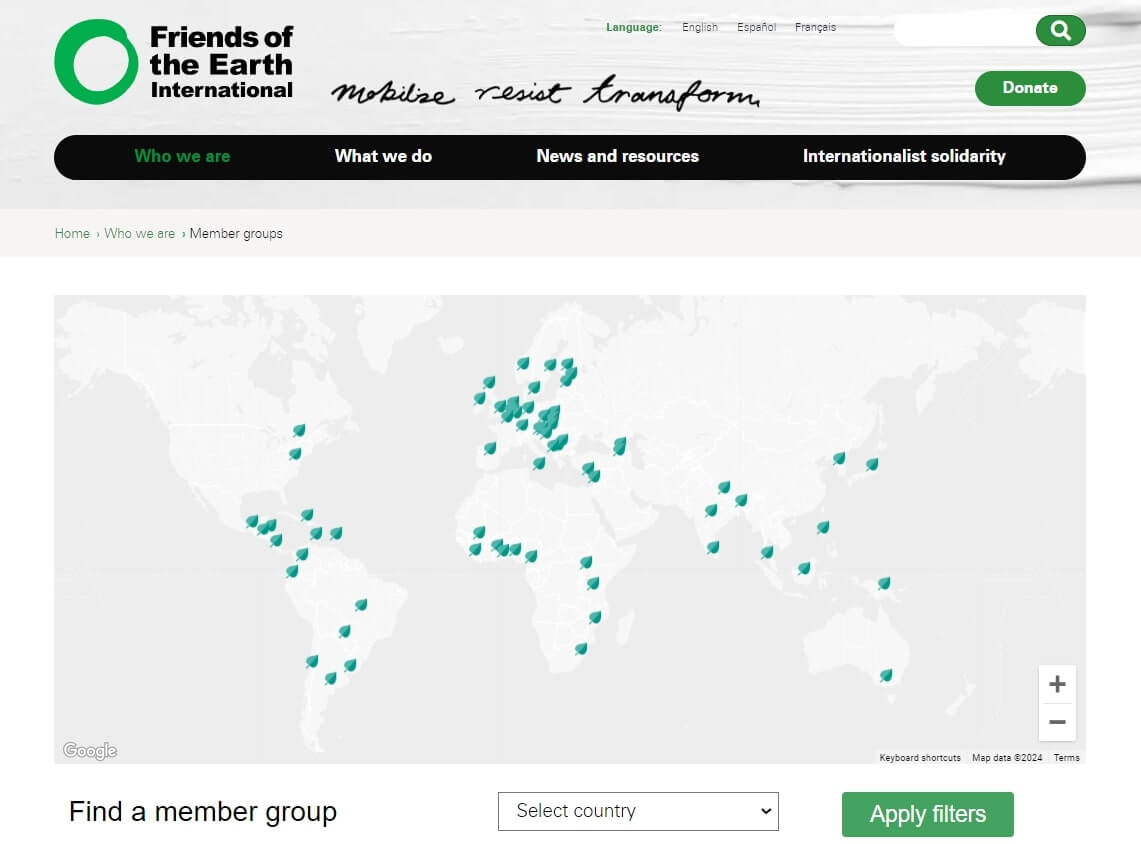
Friends of the Earth is an international network of environmental organizations dedicated to promoting environmental sustainability, conservation, and protection of the planet. The organization operates in more than 70 countries and has millions of members and supporters worldwide.
Friends of the Earth engages with communities, individuals, and organizations to build a global movement for environmental justice and sustainability. The organization provides opportunities for people to get involved in campaigns, take action on environmental issues, and participate in advocacy efforts.
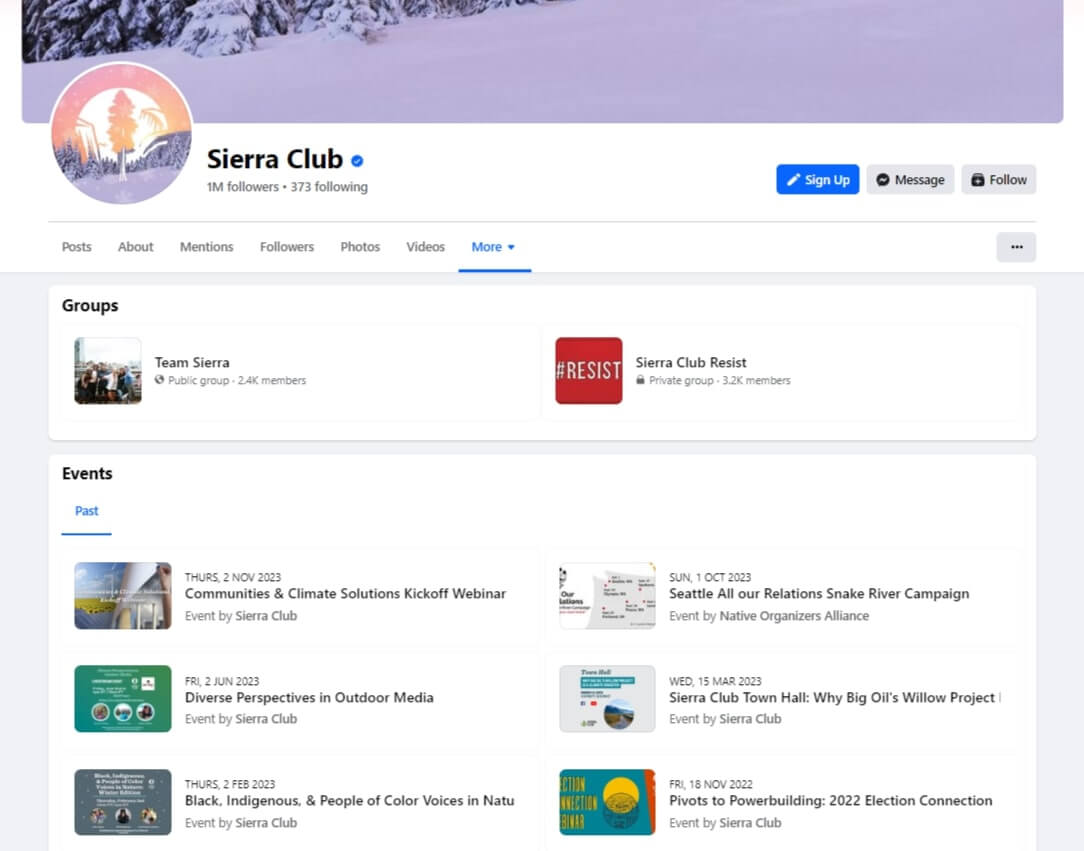
The Sierra Club is one of the oldest and largest grassroots environmental organizations in the United States. The organization works to safeguard natural habitats, combat climate change, promote clean energy, and advocate for environmental justice.
It relies on a network of volunteers, activists, and supporters to advance its mission and goals. Volunteers participate in advocacy campaigns, organize offline and virtual events, lead outdoor outings, and contribute their time and expertise to various environmental initiatives. The example features both its private and public Facebook groups.
Tips for building: Create a safe and supportive environment, moderating effectively, encouraging inclusivity and activism.
Type #5: Lifestyle Communities
Centered around specific lifestyles or life stages, these groups cater to individuals sharing similar life experiences or interests. Examples include parenting forums, fitness, wellness and healthcare-related groups, and travel enthusiasts’ communities.
They offer a platform for sharing tips, personal stories, and advice relevant to a particular lifestyle. These communities are characterized by their relatability and the personal value they add to their members’ everyday lives.
Examples: Parenting forums, fitness and wellness groups.
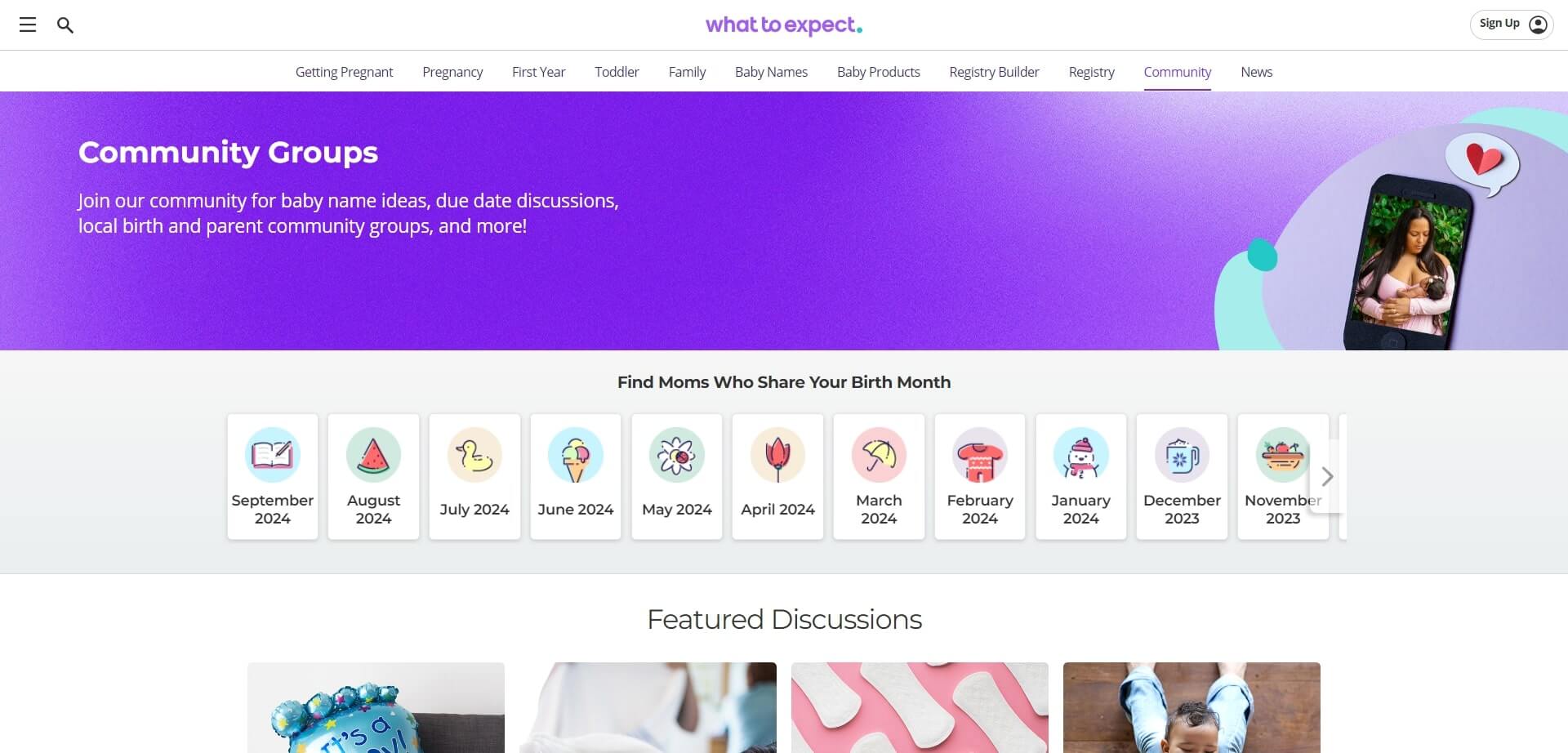
What to Expect is the most trusted pregnancy and parenting brand online whose mission is to empower, positive personalized and elevant information, support, and community for every step of the parenting journey. Its community groups offers a platform for users to connect with each other, ask questions, share experiences, and offer support related to pregnancy, childbirth, and parenting.
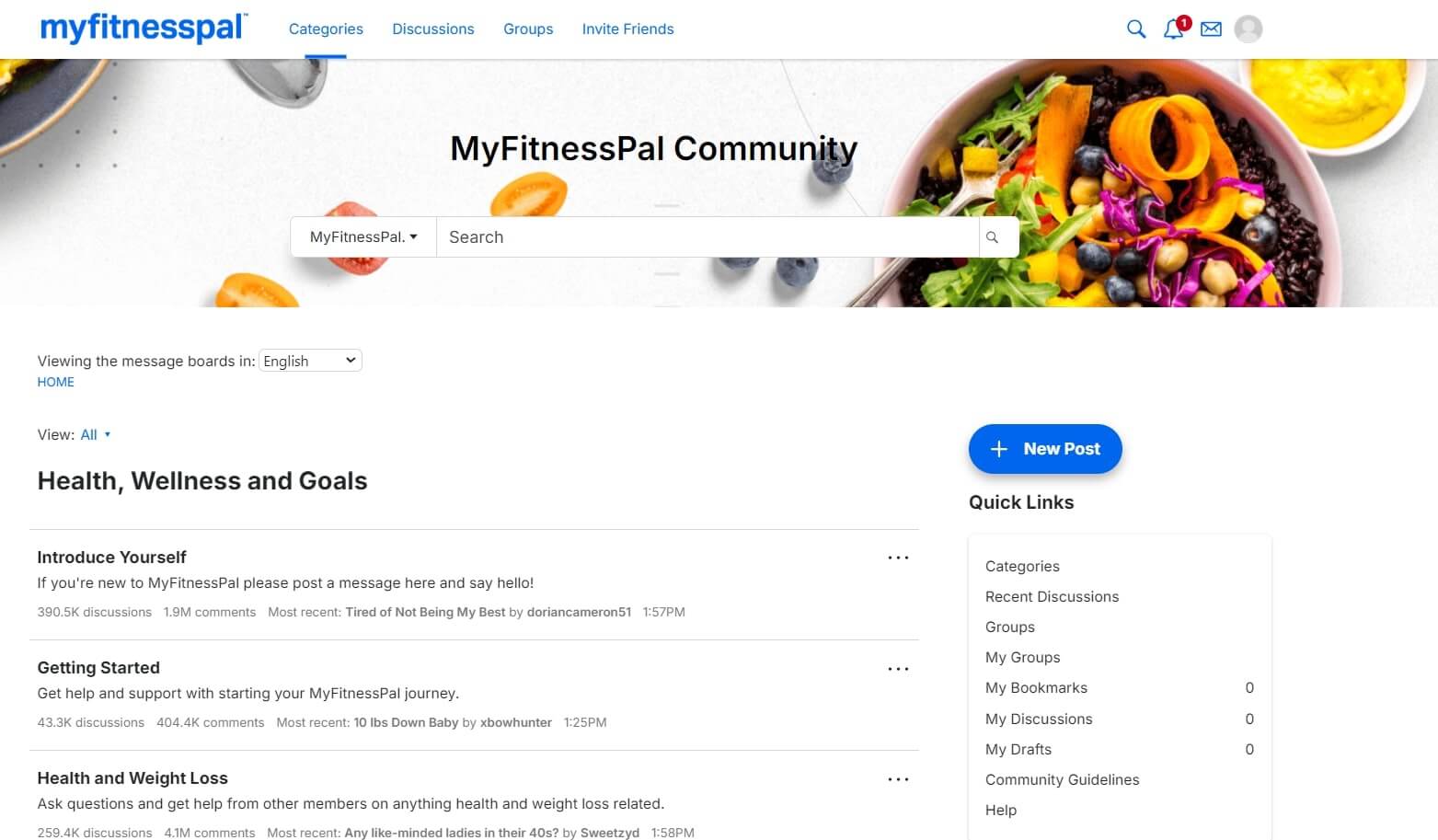
MyFitnessPal is a popular smartphone app and website designed to help users track their diet, exercise, and overall fitness goals. It provides tools for logging meals, monitoring calorie intake, tracking exercise, setting fitness goals, and analyzing nutritional information.
The platform aims to empower users to make healthier choices, achieve their fitness goals, and maintain a balanced lifestyle. In doing so, it also hosts a community forum where users can share fitness goals, seek advice on workouts and nutrition, and find motivation and support from fellow members.
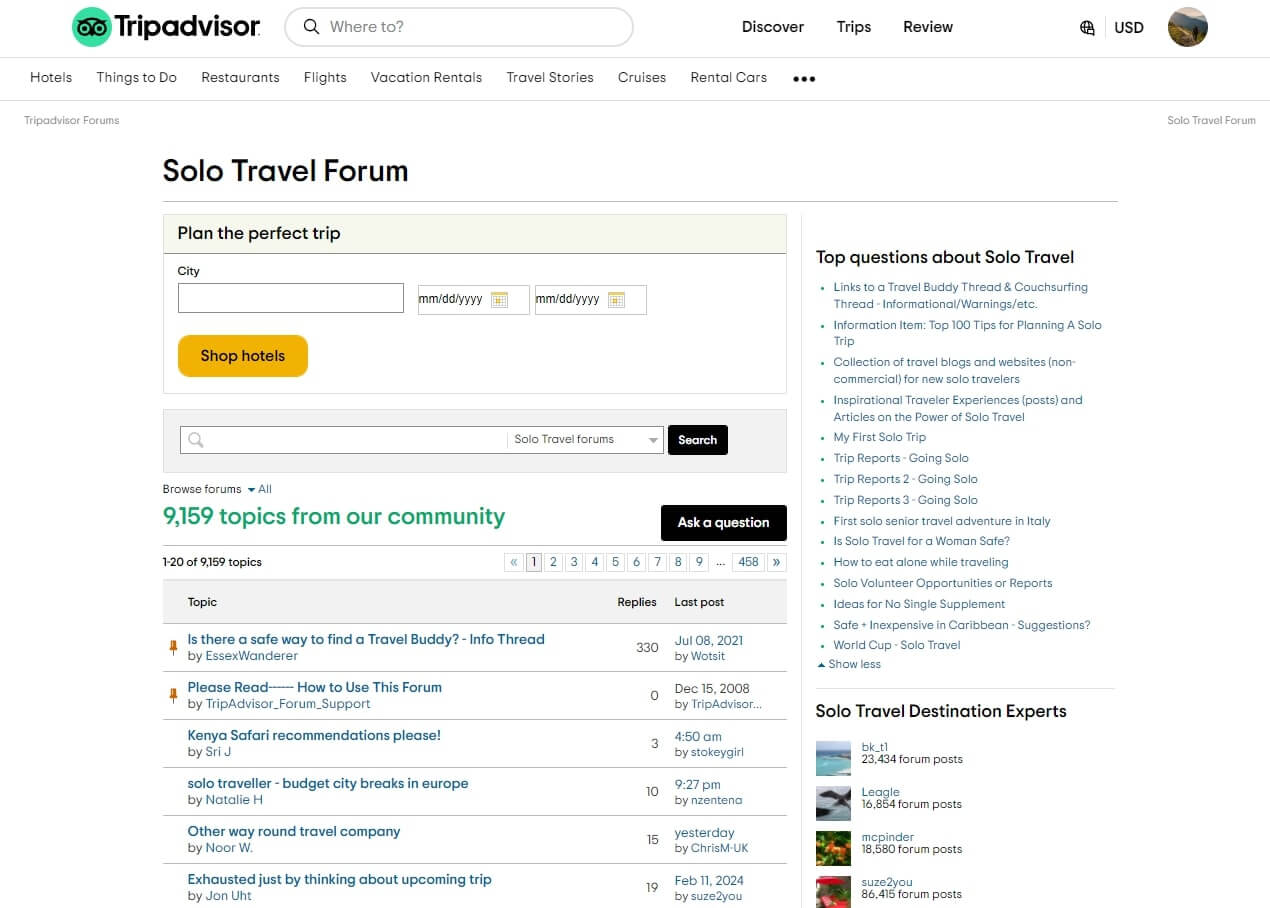
The well-known travel platform – TripAdvisor, provides reviews, recommendations, and booking options for travelers around the world. It offers a wide range of features and services to help users plan and book their travel experiences, including hotels, restaurants, attractions, flights, vacation rentals, and more.
As you can see in the example, it also hosts travel forums and discussion boards where users can ask questions, seek advice, and share travel tips and experiences with other members of the community. These forums cover a wide range of topics and destinations, allowing travelers to connect with each other and exchange information.
Tips for building: Build personalized content, engage with audience life events, creating relatable experiences.
Type #6: Fan Communities
These communities bring together fans of specific entertainment genres, artists, or franchises, even TV shows. They are a haven for sharing enthusiasm, fan art, theories, and discussion about their common interests.
Gaming communities, book clubs, and fan clubs for various entertainment media are some popular examples of these types of communities. They often host fan-driven events, discussions, and content creation – particularly user-generated content, making them highly dynamic and interactive.
Examples: Fan clubs and gaming communities
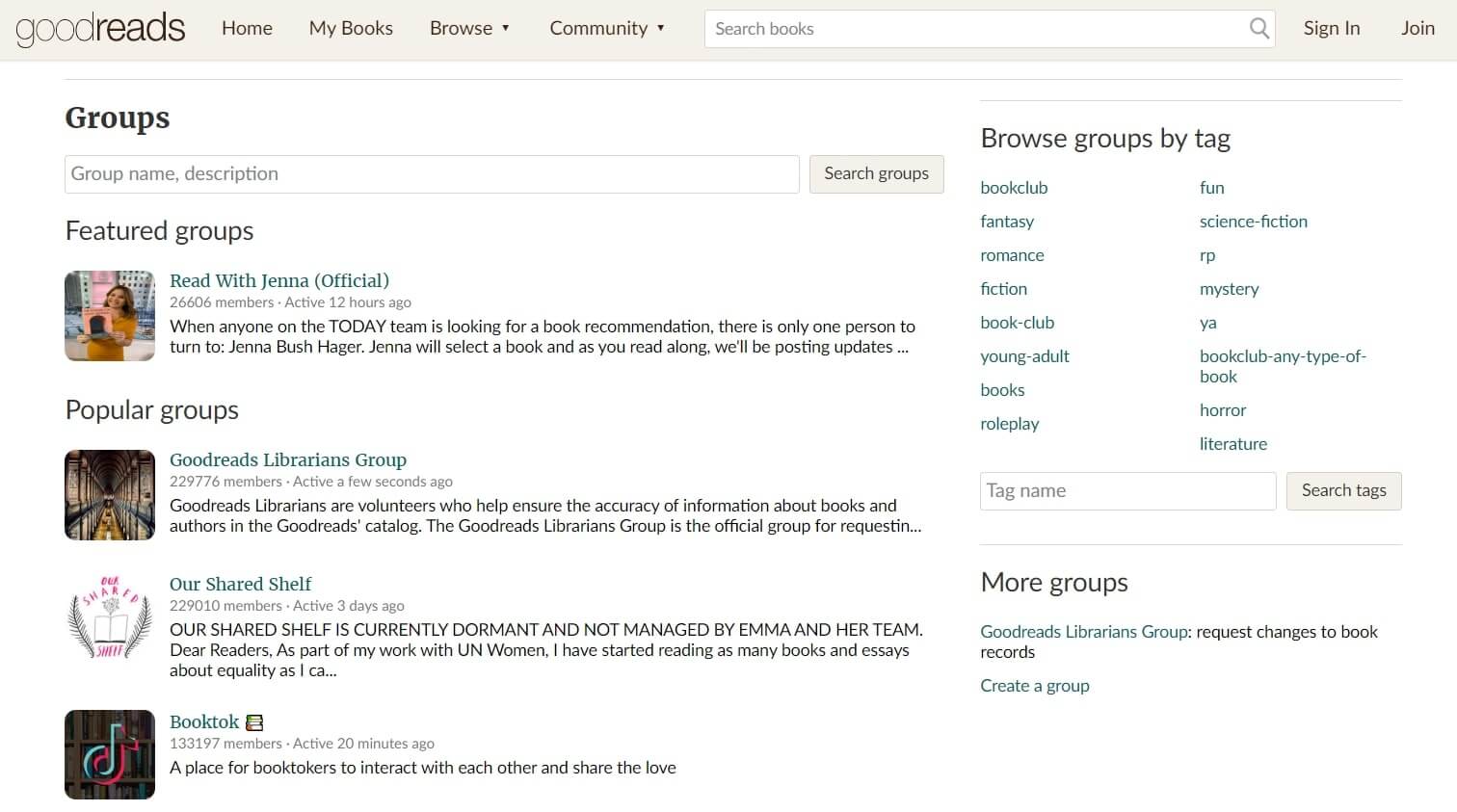
Goodreads – the online community for book lovers allows users to discover, rate, review, and discuss books, as well as connect with fellow readers and authors.
It hosts virtual book clubs and discussion groups where users can join conversations, and participate in literary discussions. These groups cover a wide range of genres, themes, and topics, allowing users to engage with diverse reading communities.
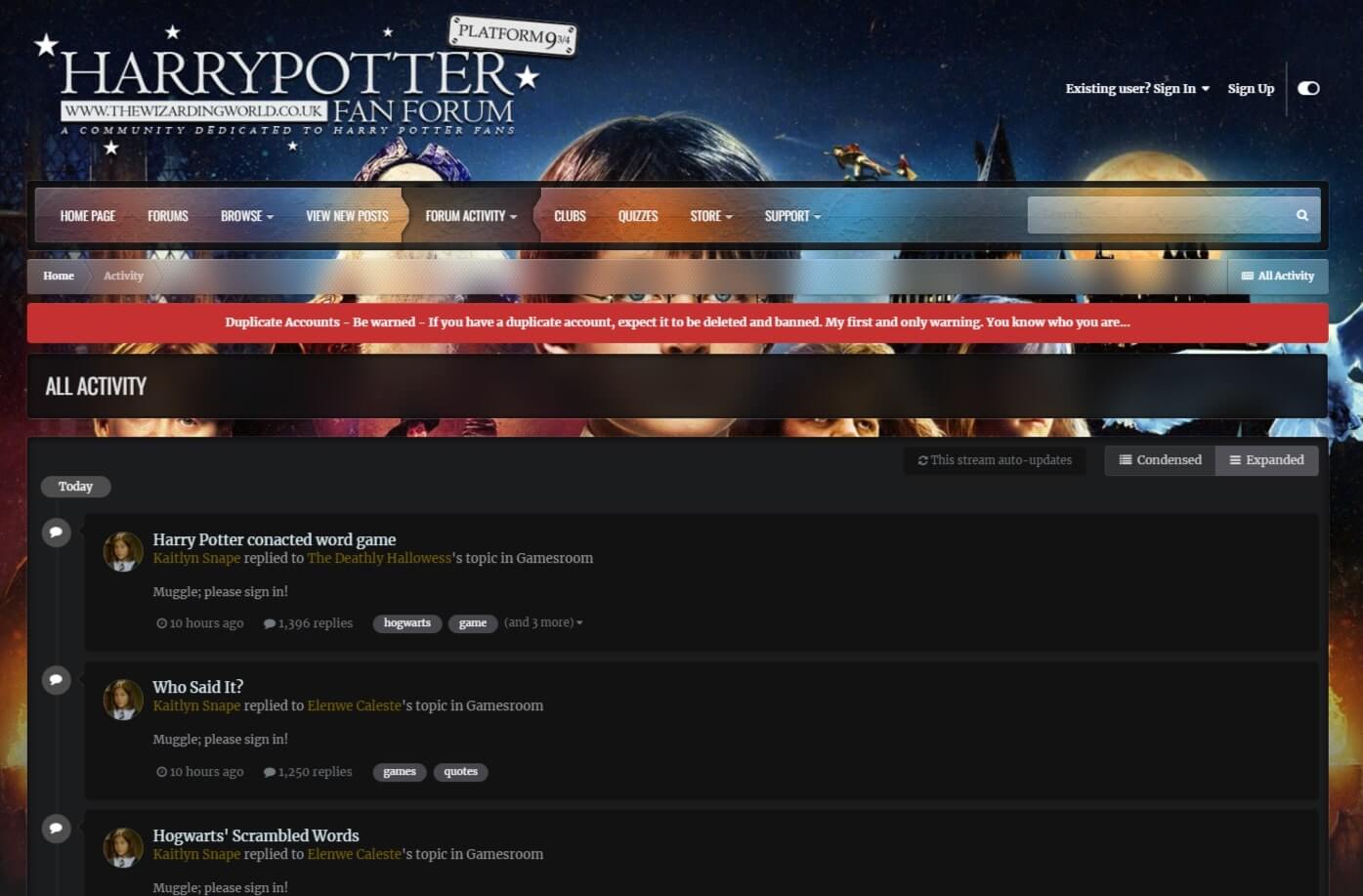
The Wizarding World is an online community platform dedicated to fans of the Harry Potter series created by J.K. Rowling. It provides a space for Harry Potter enthusiasts to connect with each other, share their love for the Wizarding World, and engage in discussions about the books, movies, characters, and themes of the series.
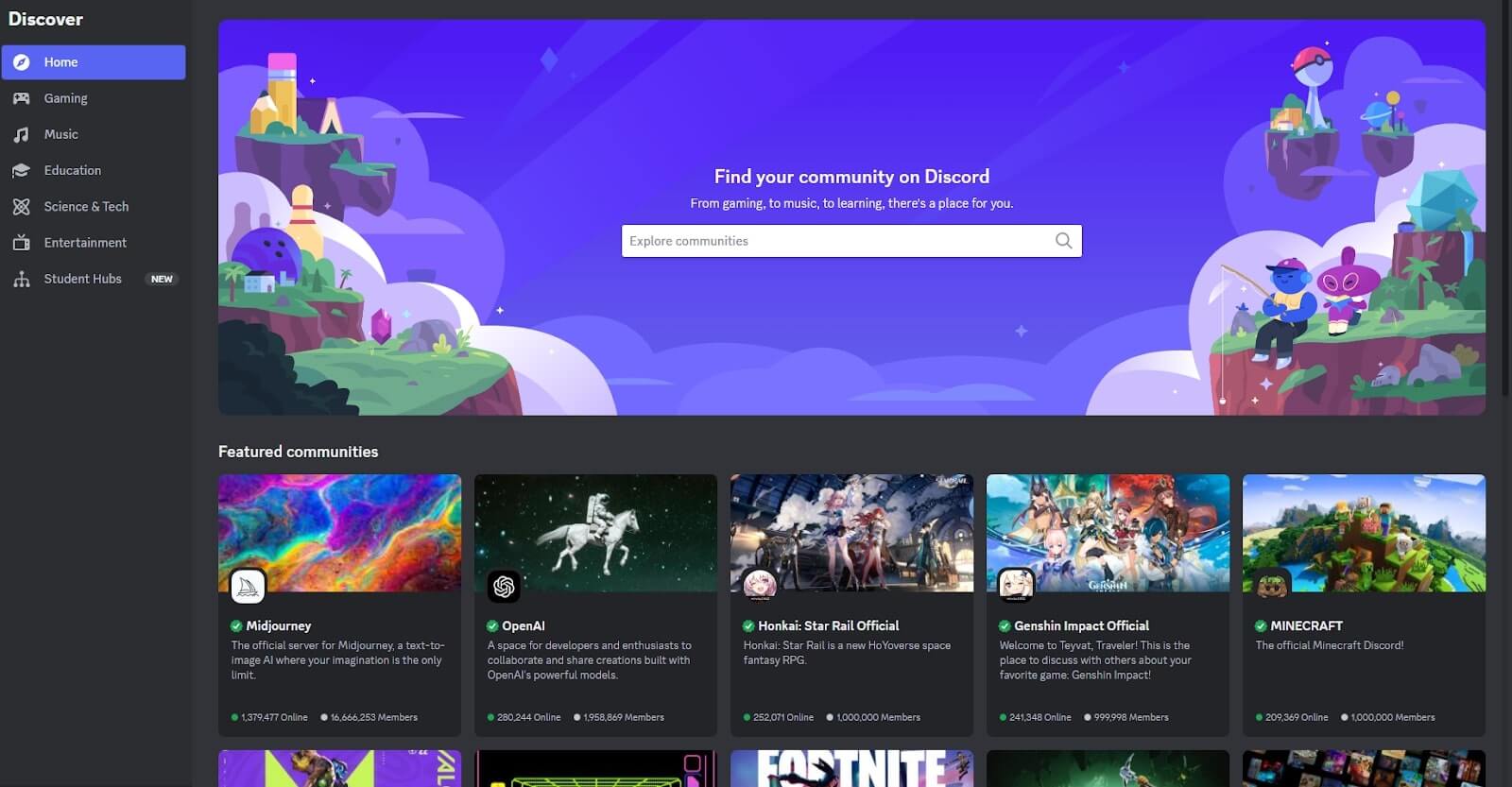
Discord is a popular platform designed primarily for gamers, although it has expanded to serve a broader range of communities and interests. It provides users with a variety of features for text, voice, and video communication, as well as tools for community organization, collaboration, and social interaction.
Users can connect with friends, join public servers, and participate in conversations with a group of people.
Tips for building: Welcome new members, host regular events, create fan-generated content, leveraging multimedia.
Type #7: E-commerce and Brand Communities
Built around brands or shopping experiences, these communities focus on customer engagement, product discussions, and brand loyalty. They include brand loyalty groups, product review forums, and customer feedback panels.
Here, customers share their experiences, offer advice, and sometimes participate in brand advocacy. These communities are crucial for entrepreneurs and brands that want to generate leads, gather insights, educate and engage with their customers more meaningfully while fostering a sense of loyalty.
Examples: Brand loyalty groups and product review forums.
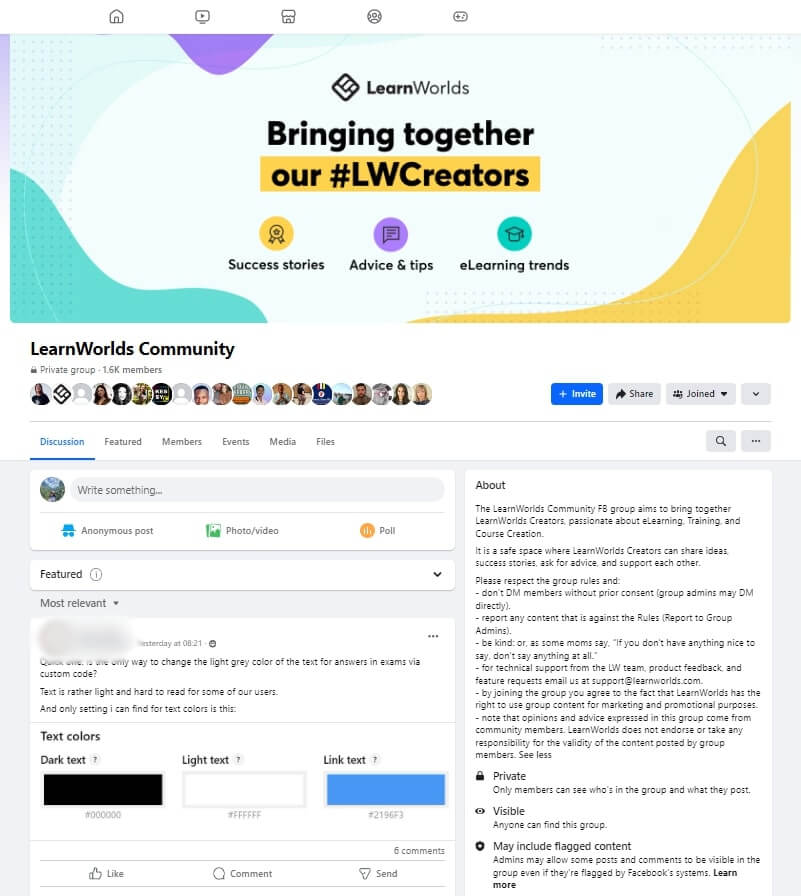
Our Facebook community serves as a space for our platform users to connect, build relationships, collaborate, share ideas, and seek support from fellow course creators and the LearnWorlds team. Users get to answer questions related to the use of the LearnWorlds platform, but they also get prompt responses to their own customer support-related enquiries.
💁 Get access to exclusive content by joining LearnWorlds private community on Fabebook here.
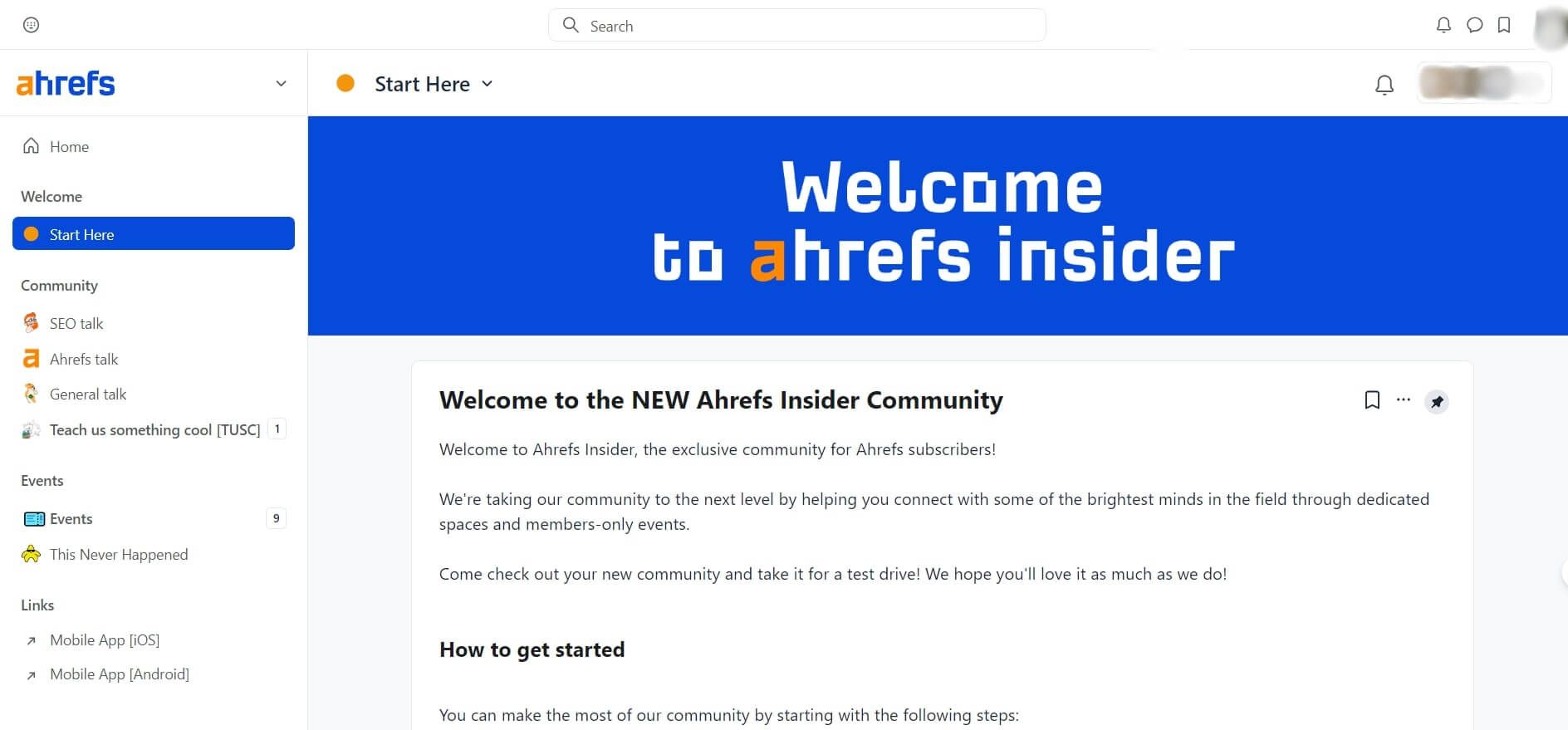
Ahrefs is a well-known SEO toolset provider that offers various tools and resources to help website owners, marketers, and SEO professionals improve their search engine rankings, analyze competitors, and optimize their online presence.
The platform also offers a social community space where users can engage with each other, share insights on user experience, ask questions related to their product, and discuss topics related to SEO and digital marketing.
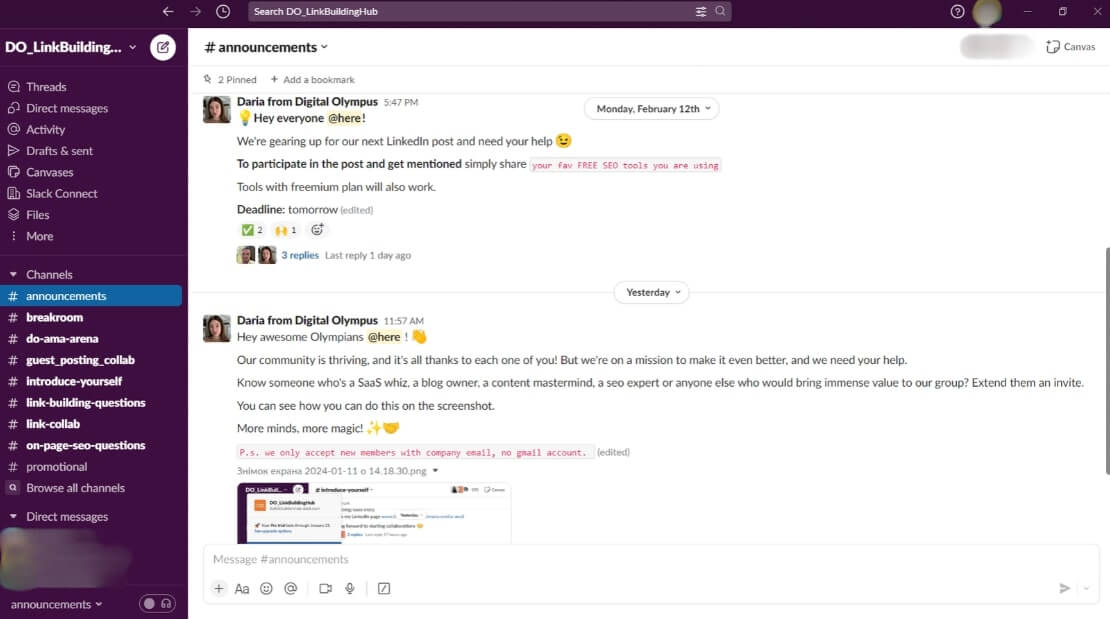
Digital Olympus is a digital marketing conference and community that hosts events, webinars, and workshops focused on various aspects of digital marketing, including SEO, content marketing, social media marketing, and more.
Their Slack community is an extension of this initiative, providing a platform for digital marketers, SEO professionals, content creators, and other industry experts to connect, collaborate, share insights, and learn from each other.
Tips for building: Focus on community engagement, follow a dedicated customer engagement strategy, offer exclusive offers, leverage customer feedback.
Type #8: Local or Regional Communities
Geographically centered, these communities connect individuals based on their shared location. They can range from neighborhood forums to social media groups focused on local interests or events.
These platforms are essential for discussing local issues, promoting community events, and fostering a sense of belonging among residents. They often collaborate with local businesses and play a crucial role in building a connected and informed local community.
Examples: Neighborhood forums and local interest groups.
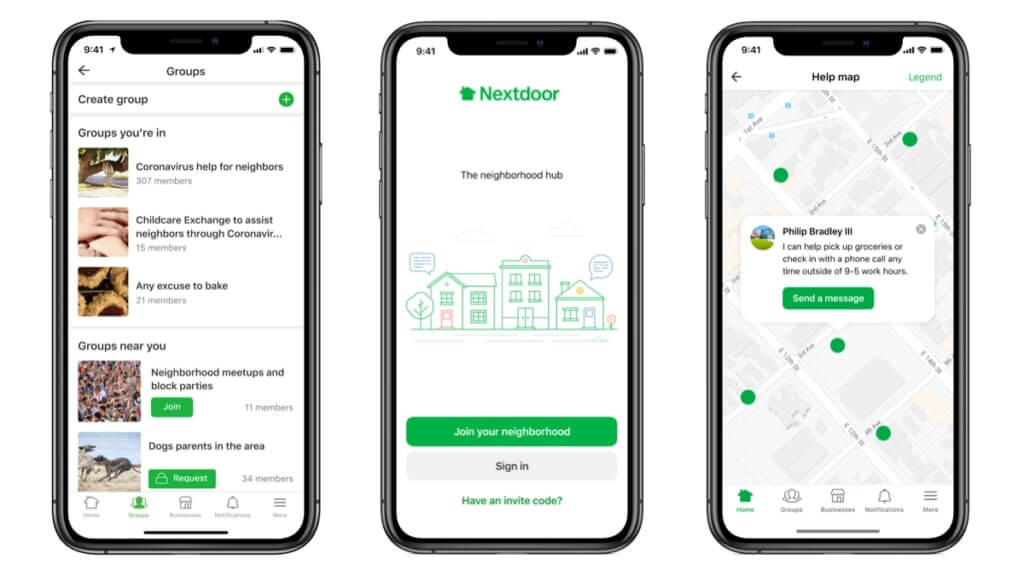
Nextdoor is a social networking platform designed for local communities, allowing neighbors to connect with each other, share information, and engage in discussions about local events, issues, and activities.
On Nextdoor’s community users may organize and promote local events, and gatherings, or share recommendations relevant to their local area. They can also share information about suspicious activities, crime reports, and safety concerns in their neighborhood, and help neighbors find their lost pets or belongings.
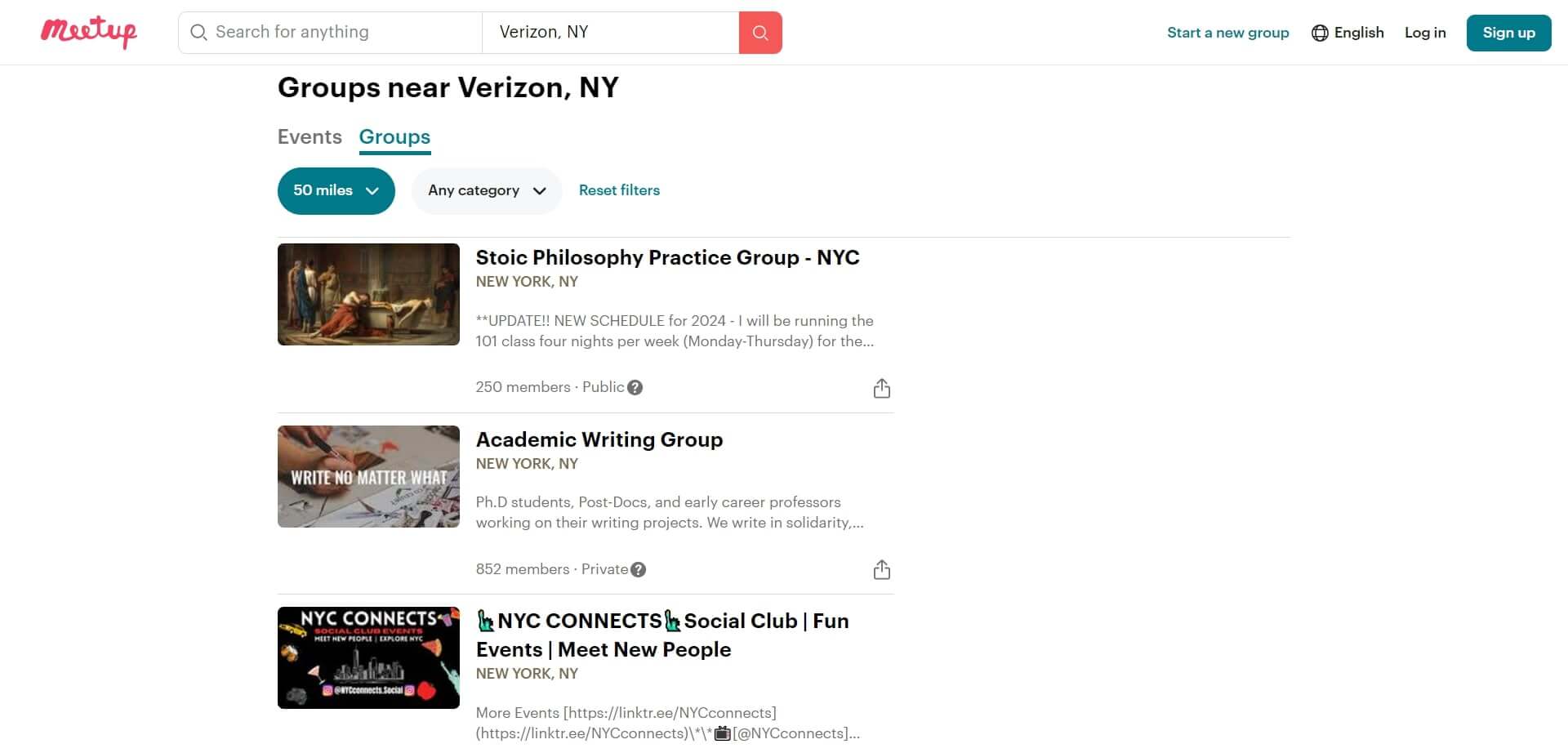
Meetup is a platform that facilitates the creation and organization of local groups and events based on shared interests, hobbies, activities, or goals. It enables people to connect with others who have similar interests e.g. philosophy or academic writing, and allows them to meet in person to participate in various activities, discussions, or events on their chosen area/location.
Tips for building: Give emphasis on local issues and events, build partnerships with local businesses, promoting local identity.
💁 If you are looking for the best online community platform in the market, make sure to check out this article.
Ready to Start Building Your Own Online Community?
Understanding the why behind online communities and how they work is crucial for creators looking to harness their power. Each type of community serves a unique purpose and caters to distinct needs and interests, and the key to building a successful community is engaging with and providing value to its members.
As a creator, it’s essential to identify which type of community aligns best with your goals and the interests of your target audience. Whether your focus is on sharing knowledge with a group of learners, building professional networks, supporting a cause, or driving brand growth, there’s a community type that fits your objectives.
Are you ready to explore the potential of online communities?
Take the first step towards building one from scratch using an all-in-one course platform that aligns with your vision and audience’s needs. Try LearnWorlds today!
Further reading
- How to Create and Sell Profitable Online Courses: Step-by-Step Guide
- Knowledge Economy: How to Sell Knowledge Online
- Sell Digital Downloads: The Complete Guide
- Personal Branding Guide: How to Build Your Brand Strategy
- Why the Creator Economy Is Booming and How You Can Join In
- How to Start a Profitable Online Course Business From Scratch
- How Much Money Can You Make Selling Online Courses?
Kyriaki is a Content Creator for the LearnWorlds team writing about marketing and e-learning, helping course creators on their journey to create, market, and sell their online courses. Equipped with a degree in Career Guidance, she has a strong background in education management and career success. In her free time, she gets crafty and musical.


